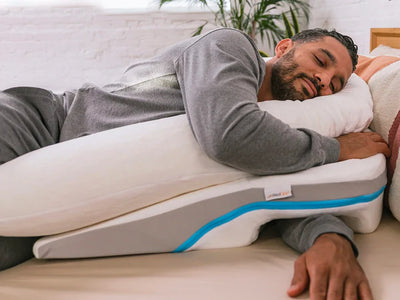
Related Product

Shoulder Relief System
$249.99 USD
Our system has a patented arm pocket that allows your arm to rest comfortably, alleviating pressure on your shoulder and triggering pain.
Why Do I Have Numbness In My Arms And Hands While Sleeping?
This article was reviewed by

Linda Bluestein, MD
Dr. Linda Bluestein is board-certified by the American Board of Anesthesiology and has been practicing medicine for over 20 years helping people restore function and improve their quality of life. She is an international speaker at the forefront of research on pain, hypermobility, and dance medicine.
Share
Waking up with numbness in your arms and hands is definitely alarming. You wake up thinking everything is fine, and the next thing you know you can’t feel anything in your hands, and it leaves you wondering: What possibly could have happened?
But waking up with numbness in arms and hands is not uncommon. We’re all familiar with the pins and needles feeling of a body part falling asleep, but when this numbness persists for long periods of time, or if it happens frequently, it could be an indication of something more serious.
So, if you’re finding yourself waking up with this numbness more often than not, it’s important to see a doctor so you can get a proper diagnosis. There are many causes of numbness in arms and hands. It could be a result of carpal tunnel syndrome. It could be because of nerve damage. It could be because of a certain medication you’re on.
In this blog post, we’ll be discussing what causes numbness and tingling in arms and hands, how to reduce this numbness, and more. Continue reading so you can have a better idea of exactly what’s causing you to wake up feeling like your arms and hands fell asleep.
- Causes
- How to Reduce Numbness in Arms and Hands When Sleeping
- Frequently Asked Questions
- Wrapping Up
Causes
Pain and numbness in your arms and hands while sleeping could be a result of a lot of different things. We’ll get into the most common causes below:
Nerve compression
The most common reason for numbness in arms and hands is nerve compression. This happens when you sit or sleep in the same position for an extended period of time, and as a result, your nerves are compressed and your blood flow is restricted.
The nerves in your arms and hands can also become damaged after repeated movements. For example, if you have a job that requires you to make a lot of repetitive movements throughout the day, you’re more likely to experience numbness and tingling in your arms and hands.
There are two types of nerve compression you can experience: radial and ulnar.
The radial nerve controls the muscles in your forearm and wrist and putting pressure on your wrist, forearm, and bicep can compress the nerve and cause numbness. This can easily happen from just sleeping in the wrong position, like with your arm draped on something. If you experience numbness in your index finger, thumb, or hand, it’s likely a cause of radial nerve compression.
The ulnar nerve is what helps you hold onto things. It runs from your elbow to your finger, and it’s also what causes the tingling and numbing sensation when you hit your elbow. Putting press on your elbow or wrist could damage the ulnar nerve and result in numbness in your arms and hands. If you experience numbness in your pinky finger, ring finger, or hand, it’s likely a cause of ulnar nerve compression.
Carpal Tunnel
Carpal tunnel syndrome is another common cause of numbness in arms and hands while sleeping. Carpal tunnel occurs when your median nerve gets compressed. The median nerve is what brings feeling to the middle and index fingers. If you experience numbness in the front or base of your thumb, or your index or middle finger, you likely have carpal tunnel syndrome.
Carpal tunnel is most common with people who do computer work, but it can happen as a result of any type of small, repetitive movement of the wrist. Carpal tunnel often improves on its own, but if it starts to impact your sleep, see a doctor. Wearing a brace and stretching your hands and wrists often can help to relieve pain. Surgery may be required, but only for severe cases where it does not improve on its own.
Pinched Nerve
Numbness from a pinched nerve can happen if your cartilage, muscles, or tendons put too much pressure on a nerve. An injury or arthritis can often result in a pinched nerve. If you experience a sharp, burning pain in your arm, a tingling feeling, or muscle weakness, you’re probably suffering from a pinched nerve.
A pinched nerve will often resolve itself over time, but over-the-counter medication can be used to alleviate the pain. If your symptoms do not improve, see a doctor. A splint, physical therapy, or further medication may be recommended.
Migraine
If you’re experiencing numbness in your arm, it might be a result of a migraine with aura. A migraine with aura is a type of migraine that can affect your vision and other senses. Some other symptoms of this condition include vision loss, seeing flashes of light, muscle weakness, and difficulty speaking.
While you can treat this type of migraine with over-the-counter medication, you’re better off playing it safe and seeing a doctor so they can make sure it’s not something more serious. A doctor may also prescribe medication to treat and prevent these migraines if the symptoms worsen.
Diabetes
Type 2 diabetes is a common health condition that causes high blood sugar levels, which can result in nerve damage. This never damage can ultimately lead to numbness in the hands and feet. Diabetes can also cause tingling or burning sensations, cramps, muscle weakness, increased sensitivity to touch, and a loss of reflexes.
While there is no cure for diabetes, medication can be taken to relieve symptoms and control blood sugar levels. Many times, blood sugar levels will improve with exercise and losing excess weight. Better blood sugar control will help to slow the nerve damage and reduce numbness.

Neurological Condition
Certain neurological conditions, like multiple sclerosis, can cause numbness in the arms. A neurological condition can also cause numbness in your feet and difficulty speaking or concentrating. If you experience any of these symptoms, see your doctor so that you can get the proper diagnosis and treatment.
Stroke
A stroke occurs when the blood supply to your brain is interrupted or reduced. A stroke can cause numbness in your arms and legs, as well as disorientation, weakness, and difficulty seeing and speaking. A stroke will happen suddenly, so if you experience any of the above symptoms, seek medical attention immediately.
The brain uses a lot of oxygen and does not tolerate well reduced or interrupted blood supply. Immediate medical care may reduce damage to the brain. If someone is experiencing any of the above symptoms, they should seek medical attention immediately.
Heart Attack
A heart attack usually happens when a blood clot blocks blood flow to the heart. There are many symptoms of a heart attack, including chest pain and shortness of breath, but arm pain and numbness is also common. Typically, numbness will occur on the inside of the left arm. A heart attack is a serious medical emergency, so if you experience any of these symptoms, call 911 immediately.
Side Effects of Chemotherapy
A potential side effect of chemotherapy is numbness and pain in the legs, arms, fingers, and toes. This is because chemotherapy can cause nerve damage. It is important to consult with your doctor to discuss how to alleviate these symptoms and rule out something more serious.
How to Reduce Numbness in Arms and Hands When Sleeping
Dealing with pain and numbness in arms and hands while sleeping is frustrating. If the pain is intense enough, it can even cause you to wake up throughout the night. But fortunately, there are various ways you can go about reducing this numbness and tingling in your arms and hands.

A few ways you can reduce numbness and tingling in arms and hands include:
- Wear a wrist brace to stabilize your wrist: Wearing a wrist brace can help reduce pressure on your median nerve. You can wear a wrist brace when sleeping or when performing repetitive tasks to prevent carpal tunnel symptoms.
- Adjust your sleeping position: Weird sleeping positions are not ideal and make you more likely to experience numbness in your arms and hands. In order to get a good night’s sleep and reduce numbness. you need to figure out the best sleeping positions for you. If you suffer from shoulder pain, MedCline has a Shoulder Relief System which takes pressure off the downside arm and reduces your chances of waking up with that numb feeling in your arm.
- Don’t lay directly on arms or hands: Avoid laying directly on arms or hands, as this pressure can compress a nerve and lead to numbness and tingling in arms and hands.
- Avoid sleeping with your arms above your head: Do not sleep with your arms above your head as this can cause a pinched nerve. Instead, sleep on your side or back as it relieves pressure on your spine and allows your body to relax.
- Stretch before bed: Stretching before bed is a great way to relax your body and keep your muscles flexible, so you’re less likely to wake up with numbness in your hands and arms. Stretching before bed can also help you get a better night’s rest.
- Consult your physician to rule out underlying conditions: If your numbness persists for extended periods of time, consult your doctor. Your physician will be able to identify the root cause of the pain and numbness and can rule out any underlying conditions.
Frequently Asked Questions
How do I stop my arms from going numb when I sleep?
To stop your arms from going numb when you sleep, avoid laying on your arms under your pillow. This can compress the nerves in your arms, which can lead to numbness. You can also use a specific pillow for arm numbness, which will take the pressure off your downside arm and allow your arm to rest without restricting blood flow.
What does it mean when your arms and hands keep going numb?
Arm and hand numbness can happen because of many different things. It can mean your nerves are damaged or compressed, but it can also be a symptom of other health conditions, such as diabetes or a stroke. If you're experiencing consistent numbness in your arms and hands, consult your doctor so you can get a proper diagnosis.
Why do hands go numb when sleeping?
If your hands go numb while you’re sleeping, you likely slept in an uncomfortable position that put too much pressure on your hands. This pressure on your nerves will cause a lack of blood flow that results in numbness.
When should I worry about hand numbness?
If your hand stays numb for a long period of time, or you’re constantly waking up with numb hands, then it’s likely an indication of something more serious and you should seek medical attention. If you experience hand numbness in addition to other symptoms, such as sudden weakness in your arms or legs, it could be a sign of stroke.

Wrapping Up
Dealing with numbness and tingling in your arms and hands can have a serious impact on your quality of sleep. If you suffer from shoulder pain that causes you to wake up with a numb feeling in your arm, check out MedCline. MedCline carries a Shoulder Pain Relief System pillow that is uniquely designed to reduce pressure on your arm while you sleep. With MedCline, you’ll never have to worry about waking up with that pins and needles feeling in your arm ever again.
Related Product

Shoulder Relief System
$249.99 USD
Our system has a patented arm pocket that allows your arm to rest comfortably, alleviating pressure on your shoulder and triggering pain.
